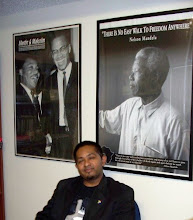Walking the talk in honouring and commemorating the Youth of June 16th, 1976!
The Youth of 1976 stepped out from Morris Isaacson High School and marched down the dusty streets of Soweto without all of their ducks in a row, but there was a projected hope, a projected goal and projected intention to see South Africa being a country for all to enjoy their liberty, and equal access to opportunities, and more especially the access to the rights of all humanity being up held.
The actions of these hundreds upon hundreds of young people may not have been well established or even fully thought through, perhaps there were those who marched just because of the hype, but whatever the reason for their presence in the march, the collective actions of the youth of 1976 brought the world’s attention onto the harsh social realities and injustices of Apartheid. While the youth of June 16th, 1976 will be remembered it is also important to point out the youth of June 17th 1976 who even after knowing fully the possible endangerment, continued to march and voice their cries for the abolishment of an education system that was dysfunctional and demeaning.
In our everyday world there remain potent opportunities for people to take action as to bring about healthy change. But there are many people who are trapped in a culture of inaction and passivity. We find youth and communities from which they come, unable to respond to the social pressures that plague our communities. The culture of acquiescence is disheartening but it is a reality when so called responsible members of society go about their 8 to 5 or 9 to 5 lives without the heart and passion to realize a better social order of healthy communities where children, youth, adults and families are developing in encouraging, safe and healthy environments.
In my work and learning of youth development and community development, youth and communities are longing for a place that is self enhancing and charged with a positive vibe, a place that builds unity and allows people to develop personally and communally, a place where people can grow and become the best that they can be, for their personal lives and their community’s at large.
Youth and communities in our current day can draw wisdom and inspiration from the youth of 1976 and the June 16th uprising while considering two important values that have the potential to inspire, motivate and realize what Dr. Martin Luther King called the Beloved Community, these two values are: “Being proactive and Working as teams”:
• BEING PROACTIVE, the youth of 1976 took the initiative to bring about change that they required in their world’s arrange. We can draw from the actions of these youth to inspire as we go on our way. Being proactive calls for us to anticipate instead of being reactive, but sometimes the journey requires for us to go the distance with trust and to be willing to engage even the unexpected.
“Being proactive”- encourages one to strive to stay ahead by anticipating rather than reacting, while carefully considering one’s actions- an element of being proactive would be lost if one were not willing to take a walk into the unknown- while you can project and make calculations, being proactive is an exercise that calls one to move forward in action concerning a projected goal or task without having all the conclusive data and knowing all the possible ramifications of one’s actions.
One steps forward with a hope and projected goal, and utilizing this projected goal to inspire, one continues to press on toward the projected goal which has the potential to become the realized goal. Our youth and communities can be proactive in dealing with the social pressures and evils that are killing our youth and communities.
• Working as a team, the youth of 1976 created a movement through collective action which was purposed to bring about the demise and destruction of an oppressive regime. The youth of 1976 marked history through collective and united action. The marching and singing, and vocal opposition to the Apartheid regime and its enslaving education system was challenged through a collective voice. We can draw from these youth and their collective action to further inspire us on our journey building our youth and communities. The youth of 1976 were united in their song and the chanting but they carried with them their diversity of school uniform, age, gender, language and a vast range of cultural diversity. Working as teams must encourage us to be who we are, propelling a notion of unity that is supportive of people being different but standing for a common course.
• Stay connected and committed (stay on the path), the youth of June 16th, 1976 as was stated brought the world’s attention to the evil of Apartheid, but while we honour the youth of June 16th, we must also honour the youth of June 17th who after having been through the turmoil of June 16th, returned to continue their vocal and demonstrative struggle. Such boldness and commitment must be praised and encouraged, knowingly working into a danger zone for the purpose of freedom, justice and equality for all.
May youth and communities in this day and age be encouraged to take on the social evils of our 21st century, more specifically may we be bold in ensuring that our communities develop and grow into “Beloved Communities”. May each of us honour the youth of June 16th and 17th, and the days that followed by drawing personal and communal inspiration to walk the distance and journey in commitment and integrity of being the change we require in our world’s arrange.
Subscribe to:
Post Comments (Atom)


No comments:
Post a Comment